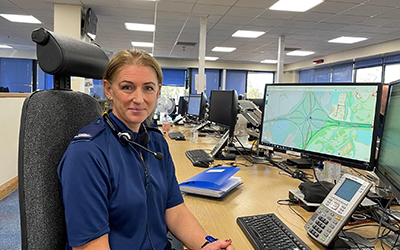Meet Ann Hillary, Contact Management Centre Officer
Length of service: 20 years
What made you want to become a 999/101 Call Handler?
It was my dad who suggested I look into the role. I was working as Cabin Crew and had been in the USA during the September 11 attacks. As a result, the airline industry was very unstable. I was looking for a change in career and a role that involved helping people, something where perhaps, I could make a difference in people’s lives. I wanted to give something back and this role seemed to fit that criterion. My dad also applied, and we worked together for 5 years before he retired.
The calls you take can be challenging – how do you and the department handle those?
The main thing I’ve always said to myself since joining was to not take calls home with me, and after taking hundreds of calls, this is something I still do to this day. After calls that I have found particularly challenging I would generally take 5 minutes out to gather my thoughts. The other operators are incredible, we are so supportive of each other and if we hear someone taking a particularly distressing call then this will be highlighted to the supervisors who can listen in ‘real time’ and support you as the call progresses. After any such call you would receive a briefing and any extra support you need, such as welfare, can be organised. We also have a wellbeing room which is a nice quiet space to go and reflect. You then come back on the phones when you are ready. The most important aspect to me is to have a clear head before every call and to treat every caller as you would wish to be treated.

How do you find the support from Thames Valley Police as a 999/101 Call Handler?
Thankfully I have never had to use the welfare department but am fully aware there is support available to staff and officers 24 hours a day 365 days a year, should the need arise. The Force wellbeing team are there to support operators not only in their role, but there to give advice outside of work to help with their mental, physical and financial wellbeing. Our Chief Constable has quoted “People are at their best when they feel safe and their wellbeing supported, allowing them to focus on fulfilling their role to the best of their ability”. After all, we aren’t robots!
What are the most important transferable skills for someone joining Contact Management?
Being able to communicate and hold a conversation is one of the most important skills you can have as an operator. This mixed in with being a good listener, being able to show empathy, to be able to remain calm under pressure, good at asserting yourself and taking control is a recipe for a good operator. You have to be able to work on your feet, you don’t know what call is coming through until the phone beeps in your ear. A lot of people also worry about typing speed, yes, it’s important but if you can control the call and communicate, it all comes together.
What would you say to others considering becoming a 999/101 Call Handler?
I have been working for Thames Valley Police for 20 years, and that speaks for itself! If you want a challenging career where no two days are the same, I would highly recommend joining the team.
Thames Valley Police (TVP) are actively on the lookout for the listeners, supporters and the advisors, recruiting Trainee Contact Management Centre Officers (999/101 Call Handlers) and Trainee Police Controllers who can be there when people need it most. To find out more about a career with TVP, please visit our Contact Management page.


 Facebook
Facebook
 Twitter
Twitter
 Linkedin
Linkedin
 Instagram
Instagram